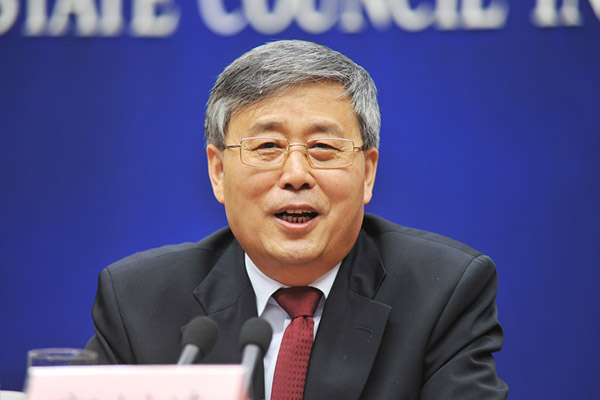Financial product rules will be unified
 |
|
Guo Shuqing, chairman of the China Banking Regulatory Commission. [Photo/VCG] |
Guo Shuqing, new head of China's bank regulation agency, said on Thursday a unified system is in the pipeline to oversee asset management products across different financial sectors.
The system's aims include reducing the risk of shadow banking and pumping more capital into the real economy, he said.
The unified regulation would comprise a foundation for regulators in banking, securities and insurance to follow, Guo said at a news conference, where he made his debut as chairman of the China Banking Regulatory Commission.
Those regulators will be free to build on that foundation by creating rules requiring higher standards, he said. No specific date has been announced for the new system's rollout.
"Some cross-sector financial products are nested in multiple layers. Nobody knows where the capital eventually flows to. This phenomenon is the result, to a large extent, of lack of regulations," he said.
"We'll go through regulations on various types of banking business, and promptly update those that lag behind the latest developments in the banking business and risks, and abolish outdated rules."
The unified regulation clearly requires more regulatory coordination, analysts said.
Academics are calling for reform of the financial regulatory framework, involving banking, securities and insurance watchdogs, which are now operating under independent and isolated conditions.
But Guo said hearsay that he will lead the merging of the central bank and three regulatory commissions is only "rumors", without elaborating whether they will be merged in the future.
Instead, banking regulators will take an active part in and fully cooperate with the building of a coordination system among the central bank and three financial regulators, he said.
This will involve greater information sharing and coordination, as well as improving monitoring, early warning and prevention systems and control of systemic risks, Guo said.
The unification of regulations on asset management across different sectors in China is expected to cut back on companies using loopholes to avoid the rules.
Zeng Gang, director of banking research at the Institute of Finance and Banking under the Chinese Academy of Social Sciences, said: "Currently, different financial institutions have their own asset management products under different regulatory requirements. Each asset management product is quite different from the others in terms of its sources of money, group of clients and destination of investments.
"As asset management regulations are different across sectors, a financial institution can invest its products in those of other institutions in other sectors ... to avoid certain regulations in its own sector. By making a unified basic regulation on the same standards, regulators will solve the problem."
The central bank, along with the regulators in the three sectors, also will build a statistical system and a database for financial products to have a clear understanding of where the money comes and goes, according to Zeng.
"If regulators find the money goes into an area they disapprove of, they can call off that particular business. The increase of regulatory costs will also motivate banks to inject more capital in the real economy," Zeng said.
- China's new banking regulator vows to tighten supervision, curb risks
- Central bank reassures foreign-invested firms on profit repatriation
- Online channels shine with gold-backed financial products
- Central bank warns Bitcoin exchanges over margin trading, money laundering
- China's monetary policy to be more prudent, neutral









